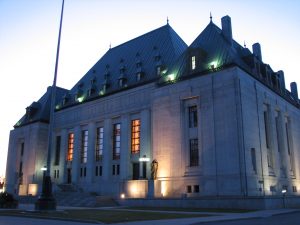
By Keely Kinley
The Supreme Court released its highly anticipated decision in R v Barton on May 24, 2019.
In 2011, Cindy Gladue was found deceased in the bathtub of Bradley Barton’s hotel room with a fatal 11-cm gash in her vaginal wall. Barton admitted to accidentally causing Ms. Gladue’s death during what he characterized as rough but consensual sex and was acquitted by a jury on charges of first-degree murder and manslaughter. The trial was subject to much public criticism for the frequent reference to Ms. Gladue as a native girl and prostitute by counsel and the trial judge, and for the Crown’s introduction of a piece of Ms. Gladue’s preserved pelvic tissue as evidence. Feminist and indigenous groups, in particular, decried the discriminatory and dehumanizing manner in which Ms. Gladue was treated throughout the process.
On appeal (R v Barton, 2017 ABCA 216), the Alberta Court of Appeal found that the trial judge should have heard a section 276 application to determine whether evidence about Ms. Gladue’s sexual history was admissible and overturned Mr. Barton’s acquittal. Barton had paid Ms. Gladue $60 for sex the night before her death and testified that Gladue “knew what she was coming for” when she met him for sex again the following night. Section 276 of the Criminal Code, otherwise known as the “rape shield” law, prevents evidence of a complainant’s sexual history from being presented unless it is deemed relevant in a separate hearing without the jury present. Barton appealed to the Supreme Court.
Writing for the majority, Justice Moldaver found that a new trial was necessary because a section 276 hearing was never conducted. Such a hearing may have helped prevent Ms. Gladue’s previous sexual relations with Mr. Barton and history of sex work from being used to make her seem less credible or making Barton’s belief in consent seem more reasonable.
Moldaver J also emphasized that if an accused did not take reasonable steps to ascertain communicated consent to a particular sexual activity, “the defence of honest but mistaken belief [will] afford him no shelter” and should not be put to the jury. The Barton decision affirms that there is no defence of implied consent, an accused cannot point to a complainant’s sexual history to bolster a claim of belief in consent, an individual cannot consent to sexual activity in advance, and express consent must be given for each and every sexual act.
Ultimately, the court ordered a new trial on the charge of manslaughter. The majority was not convinced that the jury would have come to a different conclusion on the first degree murder charge even if the trial had been conducted properly. The dissent would have ordered a new trial on both charges.
In addition to questions about the meaning of consent and the proper application of s. 276, one of the issues raised at the Supreme Court concerned the role of interveners in criminal justice proceedings. In its decision to overturn Barton’s acquittal, the Alberta Court of Appeal drew extensively from an intervener factum submitted jointly by LEAF and IAAW. Barton objected to the weight that ABCA gave to the joint-interveners’ submissions. The Asper Centre intervened at the Supreme Court to comment on the role of interveners in public interest litigation.
In its factum, the Asper Centre pointed out that the Crown has a distinct obligation to represent and safeguard the general public interest in criminal cases,which sometimes overrides the interests of disadvantaged and marginalized members of society. Criminal proceedings should be open to the arguments of intervener groups to the extent that a case involves the interpretation of the Criminal Code or potential changes to the common law. The Barton proceedings themselves are evidence of the diverse array of interests that can be implicated in criminal litigation; fifteen advocacy and special interest groups were granted leave to intervene at the Supreme Court. While Justice Moldaver devoted few words to the role of interveners in criminal appeals in his reasons (see paras 52-53), the critical role that interveners can – and do – play in such appeals is apparent in his decision.
Justice Moldaver took a feminist, Indigenous position on several key issues, urging judges to acknowledge and discourage prejudice against Indigenous women and girls in their instructions to juries, and emphasized that “everyone is equally entitled to the law’s full protection and to be treated with dignity, humanity, and respect.” Explicit recognition of the discrimination experienced by Indigenous women in the Canadian justice system may not have occurred without the submissions of Indigenous and feminist interveners highlighting the extent to which racist and sexist stereotypes about Indigenous women, particularly those involved in the sex trade, were at play in Barton’s original trial.
The Barton ruling should be considered a victory for interveners. While it would have been encouraging to see interveners’ contributions expressly acknowledged in the decision, as Dr. Emma Cunliffe commented shortly after the decision was released, Justice Moldaver’s “analysis of s. 276, reasonable steps and consent to the activity in question comes straight from LEAF and IAAW’s work;” the decision was “massively enriched and expanded by the work of Indigenous women’s organizations before the SCC, as well as Aboriginal Legal Services, [the Asper Centre], the Assembly of First Nations, the MMIWG Inquiry.”
Keely Kinley is the Asper Centre’s Summer Research Assistant.
